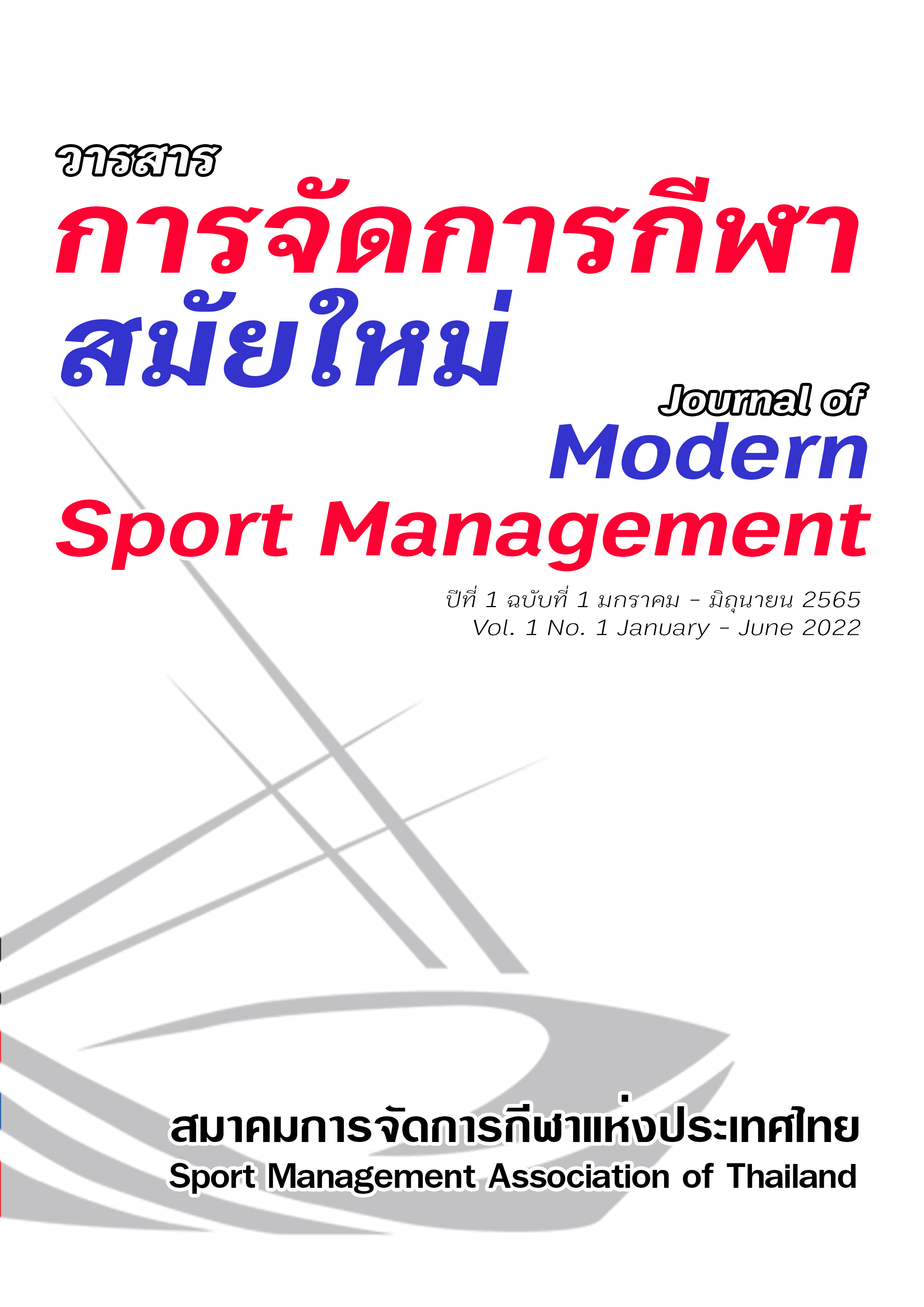THE DIRECTION OF THE SPORTS INDUSTRY ACCORDING TO THE 7th NATIONAL SPORTS DEVELOPMENT PLAN (2023-2027)
Main Article Content
Abstract
In this article, the author aims to study the fifth issue of the direction of the sports industry according to the 7th National Sports Development Plan (2023-2027). The issue is promoting and supporting the development of the sports industry. The issue was studied by analyzing and synthesizing related documents. Thai sports industry can be transformed by creating added value through stakeholders at all levels. They must consider the changing direction of the world sports industry to develop the competitiveness of sports-related industry businesses so that it covers the manufacturing sector, trade sector, and sports service sector. They must also support national and international sports events, support the organization of the private sector’s sports events, and constantly promote local identity sports tourism culture. This concrete approach ensures that the direction of the Thai sports industry will achieve its vision and goals.
To achieve the 7th National Sports Development Plan (2023-2027), stakeholders at the policy level, industry drive level, and implementation level must understand the issues in the sports industry, holistic sports management, and the sports industry ecosystem. They must be able to implement all the national sports policies, is strategy-oriented, and implements a continuous monitoring system to ensure the efficiency and effectiveness of set goals.
Article Details

This work is licensed under a Creative Commons Attribution-NonCommercial-NoDerivatives 4.0 International License.
References
CA International Information. (2019). Summary report of the follow-up assessment Implementation of the 6th National Sports Development Plan (BE 2560 2021), the first half of the plan. Bangkok: CA International Information.
Export-Import Bank of Thailand. (2015). Developing countries are not easy to move towards a consumer economy. Retrieved from https://www.ryt9.com/s/exim/2306106
Government Gazette. (2013). Professional Sports Promotion Act B.E. 2013. Volume 130.
Hums, M. A., Barr, C. A., & Gullion, L. (1999). The ethical issues confronting managers in the Sports industry. Journal of Business Ethics, 20(1), 51 - 66.
Ministry of Tourism and Sports. (2022). (Draft) National Sports Development Plan No. 7 (2023-2027). Bangkok: Ministry of Tourism and Sports.
Moen, R. (2009). Foundation and History of the PDSA Cycle. In Asian network for quality conference. Tokyo.
Montgomery, E. G., & Oladapo, V. (2014). Talent management vulnerability in global healthcare value chains: A general systems theory perspective. Journal of Business Studies Quarterly, 5(4), 173 - 189.
National Reform Steering Committee. (2016). Sports Industry Promotion. Bangkok: Secretariat of the National Reform Steering Assembly.
Pitts, B. G., & Stotlar, D. K. (2013). Fundamentals of Sports marketing. Morgantown, WV: Fitness Information Tech.
Pitts, B. G., Fielding, L. W., & Miller, L. K. (1994). Industry segmentation theory and the Sports industry: Developing a Sports industry segment model. Sports Marketing Quarterly, 3(1), 15 - 24.
Plunkett Research. (2009). Plunkett’s Sports industry almanac 2009. Houston, TX: Plunkett Research.
Scott, D. (1967). Some definitional suggestions for automata theory. Journal of Computer and System Sciences, 1(2), 187 - 212.
Shank, M. D., & Lyberger, M. R. (2015). Sports marketing: A strategic perspective. London: Routledge.
Tubtimcharoon, N. (2019). Situation Analysis for the Business of Small Hotels in Digital Economy Age in Thailand. WMS Journal of Management, 8(1), 1 - 9.
Wit Boon. (2022). Why is it so difficult to 'career' athletes in Thailand? Look at examples and find inspiration from the sports industry in US-Japan-UK. Retrieved from https://plus.thairath.co.th/topic/spark/101558


